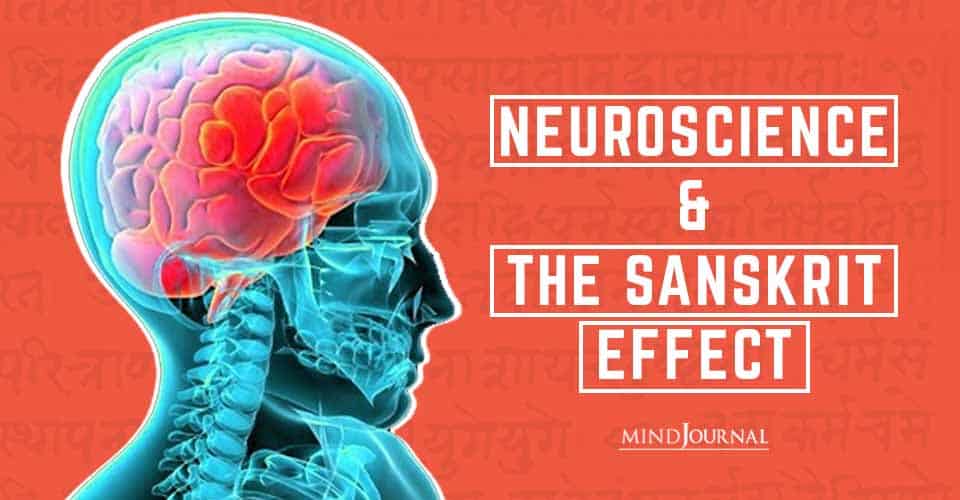Dr. James Hartzell, a world-renowned Neuroscientist, and a Sanskrit devotee coined the term “Sanskrit effect” in the journal Scientific American.
Dr. Hartzell has spent many years studying and translating the Sanskrit language and he noticed that his cognitive functions such as memory and decision making were greatly enhanced due to the Sanskrit language.
“I noticed that the more Sanskrit I studied and translated, the better my verbal memory seemed to become. Fellow students and teachers often remarked on my ability to exactly repeat the lecturers’ own sentences when asking them questions in class. Other translators of Sanskrit told me of similar cognitive shifts.”
India’s Vedic Sanskrit pandits train for years to orally memorize and exactly recite 3,000-year-old oral texts ranging from 40,000 to over 100,000 words.
“We wanted to find out how such intense verbal memory training affects the physical structure of their brains.” states, Dr. James Hartzell
Dr. Hartzell got curious to find out if memorizing Sanskrit chants can have any effects on the cognitive functions of memory and decision making.
Related: Signs You Have A Negative Spirit Or Entity Attached To You (And Ways to Get Rid of It)
He formed a team comprising of his colleagues from the University of Trento in Italy and few doctors from the National Brain Research Centre in Haryana, India to undertake a formal study to find out the effects of Sanskrit language on the brain.
The study consisted of 42 volunteers, out of which 21 were professionally qualified Sanskrit pundits, aged around 21, who had been trained for 7 years in their childhood in reciting Shukla Yajurveda,(which is a Sacred Sanskrit text and takes six hours to chant) and another 21 regular males of similar age bracket from nearby colleges.
Brain Imaging
The study involved brain imaging of these 42 volunteers with a method called structural magnetic resonance using the magnetic resonance imaging instruments at NBRC, India.
The study enabled them to find out the shape and size of different regions of the brains of these individuals.
Related: Untreated Depression Can Change the Brain Over Time – Study Says
A Startling Discovery
“What we discovered from the structural MRI scanning was remarkable.
Numerous regions in the brains of the pandits were dramatically larger than those of controls, with over 10 percent more grey matter across both cerebral hemispheres, and substantial increases in cortical thickness.
“Although the exact cellular underpinnings of grey matter and cortical thickness measures are still under investigation, increases in these metrics consistently correlate with enhanced cognitive function.” Dr. James Hartzell
The results of the study were startling.
The team found out that the brain of the 21 Vedic pundits had denser grey matter as compared to the group of other 21 males.
The so-called grey matter of the brain is actually a region containing neuronal cells and areas responsible for:
- Sensory perceptions
- Memory
- Speech
- Muscle control and decision making.
And connected to it is the other part, i.e., the white matter of the brain -nerve cells that carry the signals to the grey matter part of the brain.

Another important constituent in the human brain is Hippocampus:
Hippocampus is a small organ located in the middle region of the brain, responsible for registering and regulating all our emotions associated with memory (especially the long term memory) and has both front and back parts.
The back part is involved in memory and supports recollection of events.
And then there is another part called the Cortex:
Which is the outermost layer surrounding the brain, responsible for higher cognitive functions like decision making.
Related: How Cognitive Distortions Harm Us
After the study, it was found out that not only the grey matter was higher in brains of Vedic pundits but also their cortex region was thicker and the hippocampus was more prominent than the other set of 21 controls.
It has been proven by Neuroscience also that rigorous memorizing can have positive effects on the brain.
And therefore, it is not surprising to see that memorizing rigorous Sanskrit chants can improve the cognitive functions of memory and better thinking.
Related: 10 Signs You Are Experiencing A Re-Calibration Of Your Mind-Body-Soul System
Past Studies
It is believed that these texts contain positive vibrations that help to heal and calm a person and also help to increase the grey matter in the brain.
There have been similar experiments conducted in the past to find out the effect of chanting sacred texts on the brain.


Even 50 years ago, when there were no brain imaging methods available, a French psychologist, found out that Christian monks who were into rigorous Gregorian Chanting had exceptional memory and grey matter.
In 1967, a French scientist, Alfred Tomatis, conducted a study to find out the effects of chanting on monks who had been part of a regime that required them to chant for up to 8 hours daily.
When a new pastor came and changed their routine, cutting down the chanting time, he noticed that the monks became tired and lethargic even though they were getting sufficient time to sleep.
Alfred Tomatis thought that the chanting actually energized their brains and bodies, so he conducted an experiment to reintroduce chanting into the daily routine of monks.
The results were interesting; the monks were full of energy and vitality again.
Other experiments were conducted by Dr. Giridhar Kalamangalam and T. M. Ellmore to study the effects of Vedic chants on the brain and they also found out that the Cortex region in the brains of Vedic pundits was thicker than their counterparts.
Related: 8 Mystical Meditation Mantras That Will Raise Your Consciousness
Utilizing the ancient wisdom to improve our cognitive functions
While all of us are aware of the benefits of Mindfulness and meditation practices, these findings bring in a new perspective on how we can utilize the ancient heritage of sacred chants to improve our cognitive functions of memory (both short term and long term) and decision making.

In today’s digital age of shorter attention spans where even children are suffering from a variety of Attention deficit disorders and even the percentage of adults suffering from Alzheimer’s and other memory-related diseases is on an alarming rise, it is imperative that we tap into the ancient wisdom to improve our cognitive functions.
Related: 6 Things You Can Do To Reduce Mental Stress
Other Systemic Exercises
All these interesting findings also raise the possibility of including systemic exercises in our daily routine to improve the cognitive functions of our brain.
Just as physical exercise helps us to keep physically fit, mental exercises help to keep our brain fit by increasing the grey matter and thickness of the cortex region of the brain.
We can also include solving crossword puzzles or learning a new language or musical instrument in addition to learning Gregorian or Vedic texts chanting to keep our brains healthy.
Chanting in addition to cognitive functions of reading and writing to reduce the risk of Dementia and Alzheimer’s
In today’s digital age of shorter attention spans where even children are suffering from a variety of Attention deficit disorders and the percentage of adults suffering from Alzheimer’s and other memory-related diseases is on an alarming rise.
Even doctors are suggesting their patients inculcate the habit of reading, writing and memorizing a language to improve cognitive functions.
Related: 22 Tips to Keep Your brain Sharp and Young At Any Age
While all of us are aware of the benefits of reading and writing practices, these findings bring in a new perspective on how we can utilize the ancient heritage of sacred chants to improve our cognitive functions of memory (both short term and long term) and decision making.
There can be no better way to improve our cognitive functions than learning and reciting the ancient Sanskrit chants. It not only improves our cognitive functions but also brings about peace and positive vibrations.
Enjoyed reading the article? Share your thoughts in the comments below. Also, let your friends know about the Sanskrit effect and help them too in developing a healthy brain.
References:
- https://upliftconnect.com/neuroscience-and-the-sanskrit-effect/
- https://www.thehindu.com/sci-tech/science/the-sanskrit-effect-and-how-rigorous-memorising-helps-the-memory/article22436878.ece
- https://iskconnews.org/neurologists-study-shows-maha-mantra-could-help-anxiety-schizophrenia,5989/
- https://www.npr.org/2010/12/15/132078267/neurotheology-where-religion-and-science-collide











Leave a Reply